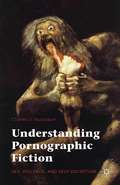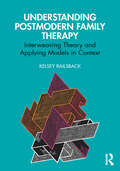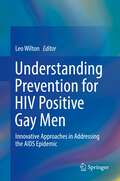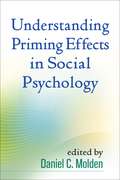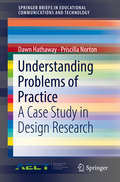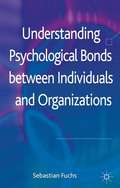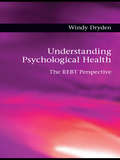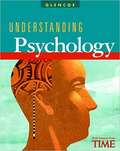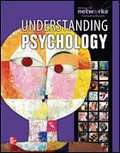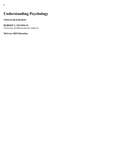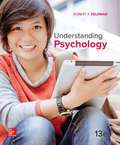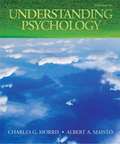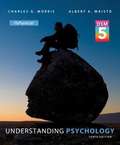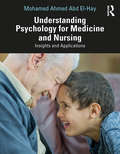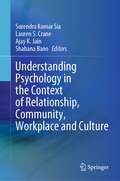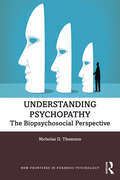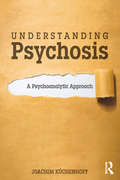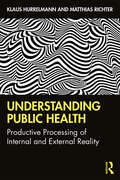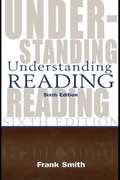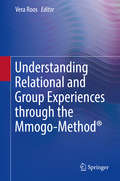- Table View
- List View
Understanding Pornographic Fiction: Sex, Violence, and Self-Deception
by Charles NussbaumThis work defends two main theses. First, modern Western pornographic fiction functions as a self-deceptive vehicle for sexual or blood-lustful arousal; and second, that its emergence owes as much to Puritan Protestantism and its inner- or this-worldly asceticism as does the emergence of modern rationalized capitalism.
Understanding Postmodern Family Therapy: Interweaving Theory and Applying Models in Context
by Kelsey RailsbackThis accessible textbook provides therapy students and practitioners with an understandingof postmodern theories, founders, and practical applications to family therapy.It introduces complex concepts in bite-sized pieces so readers can cultivate andmaster competent real-world applications of postmodern philosophy in therapy.Relying predominantly on primary sources, Kelsey Railsback shows how postmodernistideas influenced the development and implementation of postmodern familytherapy models, focusing on collaborative-dialogic practice, narrative therapy, andsolution focused brief therapy. It describes why certain therapeutic techniques developedand explains the context and history of their development. Each section beginswith an introduction to the model before moving to the philosopher and ending withthe founders’ application of philosophical ideas to therapy techniques. These chapterssummarize prominent ideas from esteemed professionals in their fields, covering thephilosophical pioneers Wittgenstein, Foucault, and Gergen and the therapy pioneersAnderson, White, Epston, de Shazer, Berg, and more. Critically, this book demonstrateshow postmodern theory can be applied in mental health practice. By the end ofthe book, students will be able to interweave the philosophers, founders, and applicationsof postmodern family therapy into a comprehensive picture. To better understandtheir epistemology and why they are more inclined toward certain practices over others,students can utilize the included self-quizzes to deepen their understanding.Filled with etymological explanations, reflective questions, keywords, and summariesthroughout, this book is designed for students and practitioners in systemic andrelational therapy or related fields such as psychology, social work, and mental healthcounseling.
Understanding Prevention for HIV Positive Gay Men: Innovative Approaches in Addressing the AIDS Epidemic
by Leo WiltonThis innovative collection offers a wide-ranging palette of psychological, public health, and sociopolitical approaches toward addressing the multi-level prevention needs of gay men living with HIV and AIDS. This book advances our understanding of comprehensive health care, risk and preventive behaviors, sources of mental distress and resilience, treatment adherence, and the experiences of gay men's communities such as communities of color, youth, faith communities, and the house ball community. Interventions span biomedical, behavioral, structural, and technological approaches toward critical goals, including bolstering the immune system, promoting safer sexual practices, reducing HIV-related stigma and discrimination, and eliminating barriers to care. The emphasis throughout these diverse chapters is on evidence-based, client-centered practice, coordination of care, and inclusive, culturally responsive services. Included in the coverage: Comprehensive primary health care for HIV positive gay men From pathology to resiliency: understanding the mental health of HIV positive gay men Emerging and innovative prevention strategies for HIV positive gay men Understanding the developmental and psychosocial needs of HIV positive gay adolescent males Social networks of HIV positive gay men: their role and importance in HIV prevention HIV positive gay men, health care, legal rights, and policy issues Understanding Prevention for HIV Positive Gay Men will interest academics, researchers, prevention experts, practitioners, and policymakers in public health. It will also be important to research organizations, nonprofit organizations, and clinical agencies, as well as graduate programs related to public health, consultation, and advocacy.
Understanding Priming Effects in Social Psychology
by Daniel C. MoldenHow incidentally activated social representations affect subsequent thoughts and behaviors has long interested social psychologists. Recently, such priming effects have provoked debate and skepticism. Originally a special issue of Social Cognition, this book examines the theoretical challenges researchersmust overcome to further advance priming studiesand considers how these challenges can be met. Thevolume aims to reduce the confusion surrounding current discussions by more thoroughly considering the many phenomena in social psychology that the term "priming" encompasses, and closely examining the psychological processes that explain when and how different types of priming effects occur.
Understanding Problems of Practice: A Case Study In Design Research (Springerbriefs In Educational Communications And Technology Ser.)
by Dawn Hathaway Priscilla NortonToday, K-12 practitioners are challenged to become educational innovators. Yet, little is available to the practitioner to guide their reflection about the design, development, and implementation of these innovations in their own practice. This brief approaches such problems of practice from the perspectives of design research. Although design research typically centers on the partnership between researchers and practitioners in real-world settings, relationships between researchers and practitioners are not always practical. In this brief, the authors explore how the design research process can make the goals, assumptions, processes, methods, and outcomes of design research uniquely accessible to the practitioner. In clear, explicit language, it introduces design research to practitioners using both expository discussions and a robust narrative case study approach that ably guides the reader through the phases of design research, namely:Theory to innovation to practiceUnderstanding problems of practiceCreating a design solutionAssessing the design solutionEvaluating learning outcomesCapturing lessons for practiceUnderstanding Problems of Practice is a singular resource for teachers and practitioners enrolled in graduate research courses or courses on teacher leadership. It also lends itself well as a supplement to professional development activities and studies at the district, school, and professional learning community levels.
Understanding Procrastination at Work: Individual and Workplace Perspectives (ISSN)
by Beata BajcarUnderstanding Procrastination at Work focuses primarily on procrastination in the workplace, and offers a synthetic and comprehensive review of major theoretical concepts and empirical findings on general procrastination and its specific manifestations, causes, and consequences in the workplace. Building on theoretical insights and empirical research, the monograph proposes and empirically verifies an expanded conceptual framework that integrates individual and work-related factors that contribute to work procrastination and mechanisms explaining this phenomenon. It sits at the intersection of two disciplines, integrating psychological and management knowledge so that a wider audience may benefit from its content. It thus sheds more light on sources and explanatory mechanisms underlying procrastination as a universal behavior in the work setting, with meaningful implications for individuals and organizations alike. Overall, the monograph can serve as a contemporary compendium of knowledge that enables the scientific community and organizational practitioners to better understand procrastination behavior and its implications in professional settings. From the theoretical and empirical perspectives, the monograph provides practical cues to develop prevention and intervention strategies to effectively address and manage procrastination and enhance employee productivity in the organization.
Understanding Psychological Assessment
by Devasena Desai Jan J Laak Meenakshi GokhaleUnderstanding Psychological Assessment presents a comprehensive overview of the history of psychological assessment and its domains of application. It gives a realistic account of how psychological theory, measurement, and instruments can help the practitioner in understanding, explaining, and predicting a client's problem or question. Using a systematic framework, it also reflects on the history, needs, methods, and consequences of psycho-diagnosis. Using this book as a guide, the practitioners and the students will be able to conduct a comprehensive assessment of the client.
Understanding Psychological Bonds between Individuals and Organizations
by Sebastian FuchsOrganizations operating in competitive environments habitually seek ever-new avenues to increase and optimize the performance of their individual employees. One popular device to increase employees' performance, especially those elements of performance that are left to the discretion of an individual, refers to the idea of creating a strong, meaningful psychological bond between an individual and an organization. Understanding Psychological Bonds between Individuals and Organizations looks at precisely this device and proposes a novel, integrated and comprehensive model which investigates the different mechanisms that help to explain such psychological bonds.
Understanding Psychological Health: The REBT Perspective
by Windy DrydenThis book draws on Rational Emotive Behaviour Therapy (REBT) - which focuses on resolving emotional and behavioural problems and disturbances and enables people to lead happier and more fulfilling lives - to provide an understanding of psychological health. Each chapter looks at an important aspect of psychological health and then discusses it in relation to the REBT approach. Divided into two parts the book looks first at how people can remain psychologically healthy in the face of adversity and then goes on to discuss how these healthy philosophies underpin certain key areas of psychological health. As such, topics of discussion include: flexibility acceptance self-motivation resilience. Understanding Psychological Health will be of great interest to all therapists in both practice and training.
Understanding Psychology
by Richard A. Kasschau Glencoe McGraw-Hill Staff MacMillan/McGraw-Hill StaffThe overall philosophy of Understanding Psychology is to bring complex psychological concepts to students' lives. The goal of this program is to make psychology relevant, fun, interesting, and even exciting, making it approachable. <p><p> The Understanding Psychology program was designed to help students understand how this subject is part of their day-to-day lives. Research in assessment and APA literature was reviewed. The program's authors, academic consultants, and experienced Social Studies educators reviewed the assessment plan for Understanding Psychology. Understanding Psychology includes a variety of assessment instruments to support instruction. The test booklet provides three-part chapter tests: Matching, Multiple Choice, and Essay.
Understanding Psychology
by Richard A. KasschauThis book offers a rigorous presentation of psychological science with numerous and immediate examples.
Understanding Psychology
by Richard A. KasschauConnect complex psychological concepts to real life Understanding Psychology simplifies complex psychological concepts for students. The program’s philosophy is to make psychology relevant, fun, interesting, and approachable. Understanding Psychology is an interactive book with hands-on activities, case studies, current issues, and readings about the field of psychology.
Understanding Psychology
by Robert S. FeldmanThe new edition uses “HeatMap” technology to advise the revision. Systematic and precise feedback from thousands of students was anonymously collected using LearnSmart™. Because virtually every paragraph in the previous edition is tied to several questions students answer in LearnSmart, the author was able to see where students struggled most…the “hot spots”…and in turn refine and update these areas to be more clear, more concise, and more impactful.
Understanding Psychology (13th Edition)
by Robert S. FeldmanStudents First. Designed for student success, Feldman provides students with a powerful learning framework to help them connect, engage, and feel excited about psychology. Using a revolutionary revision process, Understanding Psychology is a fully integrated learning system that brings the "Students First" goal to a new level. With the adaptive learning program, SmartBook(tm), every student has a unique experience personalized to their needs. The new edition has continued to use the "HeatMap" technology to advise the revision. Systematic and precise feedback from thousands of students was anonymously collected using LearnSmart(tm). Because virtually every paragraph in the previous edition is tied to several questions students answer in LearnSmart, the author was able to see where students struggled most. . . the "hot spots". . . and in turn refine and update these areas to be more clear, more concise, and more impactful. The 13th edition continues with Feldman's accessible pedagogy and hallmark research, as well as his modules-within-chapters format that is both manageable for students and allows every professor the flexibility to assign and cover what they want.
Understanding Psychology (9th Edition)
by Charles G. Morris Albert A. MaistoThis textbook presents a scientific, accurate, and thorough overview of the essential concepts of psychology in engaging language that the average reader can easily comprehend. Topics include the science of psychology, the biological basis of behavior, sensation and perception, states of consciousness, learning, memory, cognition and mental abilities, motivation and emotion, life-span development, personality, stress and health psychology, psychological disorders, therapies, and social psychology. For anyone who is interested in introductory psychology.
Understanding Psychology With Dsm-5 Update
by Charles Morris Albert MaistoUnderstanding Psychology, 10/e, presents a scientific, current overview of the fundamental concepts of psychology. The authors highlight enduring issues that unite all subfields of psychology: Person-Situation, Nature-Nurture, Stability-Change, Diversity-Universality, and Mind-Body. These enduring issues help readers learn the surprising unity and coherence of the diverse and exciting science of psychology. MyPsychLab is an integral part of the Morris/Maisto program. Engaging activities and assessments provide a teaching and learning system that helps students apply psychological concepts to everyday life. With MyPsychLab, students can watch videos on psychological research and applications, participate in virtual classic experiments, and develop critical thinking skills through writing. This title is available in a variety of formats - digital and print. Pearson offers its titles on the devices students love through Pearson's MyLab products, CourseSmart, Amazon, and more.
Understanding Psychology for Medicine and Nursing: Insights and Applications
by Mohamed Ahmed Abd El-HayThe book presents a comprehensive updated approach to current psychological knowledge to facilitate a rapid review of the major subjects in psychology in medicine and to stimulate further detailed study. The book is divided into five Parts. Part One provides an elaborate background of the various sub-disciplines of psychology, the various theories and schools of thoughts encompassing them. Part Two discusses the links between the physical and psychological state of being human. Part Three elucidates the basic psychological processes that shape human cognizance. Part Four talks about the different factors which influence the human psyche. Part Five discusses the various aspects of clinical psychology and their implications for the physical well-being of people. Understanding Psychology for Medicine and Nursing distinguishes itself in providing a concise, clear understanding of most of the basic topics of psychology that are essential to all students of general psychology, but particularly to medical and nursing students, and to postgraduate trainees in psychiatry.
Understanding Psychology in the Context of Relationship, Community, Workplace and Culture
by Surendra Kumar Sia Lauren S. Crane Ajay K. Jain Shabana BanoThis book explores the significant deliverables of psychology to society in five sections: identity and relationship, psychology for gainful employment, psychology customized to the community, culturally embedded psychology and alternatives for maximizing psychology. The authors, social scientists of diverse nationalities, represent novel psychological methods, tools and procedures that can have immense social utility in strengthening the relationship and rejuvenating the community. The first section offers an in-depth perspective on the dynamics between identity and relationship. The second section encompasses psychology's contribution in addressing community-based issues like farmer suicide, cyberbullying, smartphone overuse, substance abuse and collective environmental behaviour. The authors in the third section have deliberated upon the behavioural issues pertinent for gainful employment. The fourth section delineates the influence of culture on specific psychological processes. The last section touches upon means beyond conventional strategies, techniques and approaches that may augment psychology's deliverability. The chapters in this book are based upon evidence-based scholarships from seven different countries. As such, it represents an invaluable resource for research scholars and academicians in psychology, human resource managers and mental health practitioners.
Understanding Psychology, Student Edition (Understanding Psychology Series)
by Richard A. KasschauConnect complex psychological concepts to real life Understanding Psychology simplifies complex psychological concepts for students. The program's philosophy is to make psychology relevant, fun, interesting, and approachable. Understanding Psychology is an interactive book with hands-on activities, case studies, current issues, and readings about the field of psychology.
Understanding Psychopathy: The Biopsychosocial Perspective (New Frontiers in Forensic Psychology)
by Nicholas D. ThomsonUnderstanding Psychopathy is an essential, accessible new guide on psychopathy and its development. Through the lens of the biopsychosocial model, Thomson explores a wide range of factors contributing to the development of psychopathy, from the genetic to the environmental, supported by the latest research into the disorder. Thomson examines psychopathy from all angles, analysing social, psychological and biological factors, in addition to the history and assessment of psychopathy, and links to violent crime. Theory and research are supported throughout with fascinating case studies. These case studies provide accessible and relevant examples for readers who are new to the field, and to those more familiar with psychopathy and its implications. Understanding Psychopathy is a brilliant resource for psychology students, researchers and practitioners in the criminal justice system alike, with grounding in forensic psychology, clinical psychology and criminology. The author is donating his royalties in full to Project EMPOWER, UK, a multidisciplinary initiative dedicated to enhancing prevention and intervention services to individuals and their families who experience intimate partner violence, sexual violence, domestic violence, or human trafficking.
Understanding Psychosis: A Psychoanalytic Approach
by Joachim KüchenhoffDo psychotic disorders make sense? Are psychotic symptoms amenable to interpretation? Understanding Psychosis: A Psychoanalytic Approach takes the various pathways to psychotic illness outlined by psychoanalytic clinicians and scholars and integrates them into a model that allows a systematic assessment of relevant psychodynamic dimensions in the diagnosis of psychotic disorders, and which serves as a guide to psychotherapy with psychotically ill patients. Joachim Küchenhoff reviews and integrates various psychoanalytic concepts and theories about psychosis into a multi-dimensional psychodynamic model that allows an assessment and understanding of the patient’s subjective experience, objective psychological capabilities, and interpersonal resources. Küchenhoff helps the therapist to establish a basic attitude in working psychodynamically with patients and to understand the dynamics of the therapeutic relationship. Understanding Psychosis also addresses specific issues that can arise in work with clients experiencing psychosis, including understanding imminent crises or precursor states, elucidating semiotic qualities in seemingly negative symptoms, differentiating the psychotic and a non-psychotic part of the personality and providing a dynamic approach to the psychopharmacological treatment. Clinical vignettes and three detailed case reports are included in the book. Understanding Psychosis will be an essential guide for psychiatrists, psychotherapists and psychoanalysts working with patients experiencing psychosis. It will also be of use to psychologists, and academics and students of psychotherapy, psychiatry and psychoanalysis for psychosis.
Understanding Public Health: Productive Processing of Internal and External Reality
by Matthias Richter Klaus HurrelmannThis book develops a new model of the genesis of health, on the basis of the interplay between genetic and environmental factors. Hurrelmann and Richter build upon the basic theories of health and the popular model of salutogenesis to offer a comprehensive interdisciplinary theory of health genesis and success: Productive Processing of Reality (PPR). The authors show that health is the lifelong dynamic process of dealing with the internal reality of physical and psychological impulses and the external reality of social and material impulses. To demonstrate this, the book is split into three interconnected parts. Part A analyses the determinants of health, providing an overview of the insights of current research and the impact of socioeconomic influences and gender on health. Part B covers public health, social, learning and coping theories, all of which understand health as an interaction between people and their environment. Part C draws on these four theories to outline PPR, stressing the interrelation between physical and mental constitution and the demands of the social and mental environment, and suggesting strategies for coping with these demands during the life course. Understanding Public Health: Productive Processing of Internal and External Reality will be valuable reading for students and researchers in psychology, sociology, educational science, public health and medical science, and for policymakers in public health.
Understanding Reading: A Psycholinguistic Analysis of Reading and Learning to Read
by Frank SmithUnderstanding Reading revolutionized reading research and theory when the first edition appeared in 1971 and continues to be a leader in the field. In the sixth edition of this classic text, Smith's purpose remains the same: to shed light on fundamental aspects of the complex human act of reading--linguistic, physiological, psychological, and social--and on what is involved in learning to read. The text critically examines current theories, instructional practices, and controversies, covering a wide range of disciplines but always remaining accessible to students and classroom teachers. Careful attention is given to the ideological clash that continues between whole language and direct instruction and currently permeates every aspect of theory and research into reading and reading instruction. To aid readers in making up their own minds, each chapter concludes with a brief statement of "Issues." Understanding Reading: A Psycholinguistic Analysis of Reading and Learning to Read, Sixth Edition is designed to serve as a handbook for language arts teachers, a college text for basic courses on the psychology of reading, a guide to relevant research on reading, and an introduction to reading as an aspect of thinking and learning. It is matchless in integrating a wide range of topics relative to reading while, at the same time, being highly readable and user-friendly for instructors, students, and practitioners.
Understanding Relational and Group Experiences through the Mmogo-Method®
by Vera RoosThis volume describes the development and application of the Mmogo-method® as a projective visual data gathering method, applied in different contexts and with different groups of people. The Mmogo-method® provides a more profound understanding of personal, relational and group experiences. "Mmogo" means togetherness in Setswana, one of the 11 official languages of South Africa. The Mmogo-method® is particularly useful in cross-cultural contexts and across age groups, and by allowing visual expressions of the self as a complex, dynamic social system it overcomes some of the limitations of traditional data collection methods, such as questionnaires or interviews. These chapters show how this flexible, visual data collection method can be used independently or jointly with other data gathering techniques, such as journalling or in-depth interviewing, to acquire rich information. The research method described in this book enables researchers to access perceptions, feelings and personal experiences participants might find it difficult to verbalize and explain. Researchers in disciplines such as education, social sciences, consumer sciences, market research, and city and town planning will find this book and its innovative method particularly valuable in addressing a gap in available visual and other data collection resources.
Understanding Religion and Spirituality in Clinical Practice (The Society of Analytical Psychology Monograph Series)
by Margaret ClarkUnderstanding Religion and Spirituality in Clinical Practice is a volume in the clinical practice monograph series from the Society of Analytical Psychology. This series is intended primarily for trainees on psychotherapy and psychodynamic counselling courses, and for those who are newly qualified. Here, the author considers the difficulties clinicians may encounter when patients talk about God or about their spiritual life, and how necessary it is for therapists to examine their own image of God and their own understanding of spirituality, so that they can distinguish these from those of their patients. She emphasizes how varied are people's images and understanding of what "God" stands for, and how in healthy development these will change over time. The book demonstrates, through numerous clinical vignettes, how clinicians can understand a patient's talking about religion or about God - hearing the voice of God, having a vision of God, or being convinced that God wants them to act in a particular way; or, equally, seeing the Devil.
